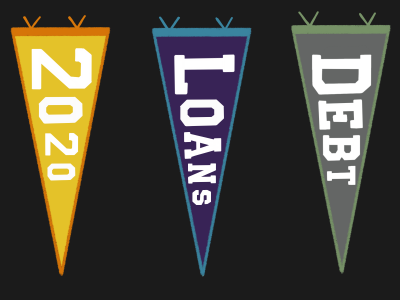Massachusetts advocates are calling on President-elect Joe Biden to do more for the student loan crisis. The state’s average student debt is higher than the national rate.
However, a striking movement against student debt forgiveness remains, and some people are basing their anger on the mere fact that they themselves had to pay them off.
This mentality prioritizes American individualism over empathy for others and stimulates no progress.

Similar sentiments circulated when Boston University announced it would implement affordableBU starting with the Class of 2024. Students were upset and felt the proposal dismissed the needs of current students. Even The Daily Free Press editorial board had disagreed with the program when it was announced.
But, progress is about addressing issues to improve our society moving forward. The unfortunate experiences we have all endured don’t justify allowing these problems to continue out of our own spite. If you can’t advocate for erasure of future student loans, for example, then you’re also no closer to having your own loans forgiven.
The burdens of student loans cause a lot of stress for and a lot of money from the average student. Financial aid can typically cover a large portion of university expenses for low-income applicants, but the middle class is often overlooked.
This disregard for the middle class is a major fault of the college financial aid system. The process examines your parents’ income and assumes they are putting that much toward your education, which is not always an accurate depiction of what families are willing, or able, to invest in their child’s education.
The student is then forced to take on the burden of their college tuition and pay a large sum in loans because they couldn’t get enough help from a university or government.
So, the middle class makes just enough money to be exempt from financial aid, but not enough to afford college in its entirety — not to mention other social barriers students face when applying for college.
On top of these disadvantages, we put a stark emphasis on college as a gateway to success, which inherently forces people to attend a four-year university and pay exorbitantly high prices for a degree.
And some people can’t simply opt out of college, either because of their chosen profession or a need for increased financial stability after they graduate.
Many students overload on classes and graduate early to minimize the cost of their degrees. We’re willing to do so for institutions like BU that have exceptional programs capable of boosting our career prospects. But, these additional burdens could be alleviated.
On the list of items Americans tend to deem a human right in this country, higher education does not seem to fit. Elementary through high school is free and accessible, but success ultimately comes at a steep price.
Education is a resource we should be willing to invest in. We pay taxes on our roads and our military, but can’t recognize that higher education is an opportunity for society to advance and innovate.
The federal U.S. government can control how much money public schools cost. Community colleges in California have provided free tuition for qualifying students, and countries around the world have incredibly low prices for public school — entirely free in some cases.
When the public sees politicians discussing possibilities surrounding free college tuition or canceled student loan debt, many immediately brand these propositions as nothing more than utopian fantasies.
Adjusting a national budget is easier said than done, and with a country divided on partisan lines, it’s difficult to imagine Congress passing a bill to help the student loan crisis.
But, it’s still possible. Politicians have made comprehensive plans for bills we deem unattainable, and voters don’t pay enough attention to the information they provide. As of now, people tend to rely largely on hearsay without offering the other side an opportunity to prove progressive plans can work.
We can change the culture surrounding higher education. We can create a more accessible environment that promotes young minds choosing a degree they are truly interested in rather than one in a subject they are pressured to study because it’s more likely to be worth the hefty financial investment.
We will have a broader array of students within our educational system who are passionate about their careers, who will have the opportunity to truly begin their “pursuit of happiness” rather than graduate straight into a lifetime’s worth of debt.
Our society’s subconscious desire to see people suffer with outdated and exploitative norms — just because we did — is selfish, and we should be putting in our best effort to actually change the systems that neglected our needs.




















































































































